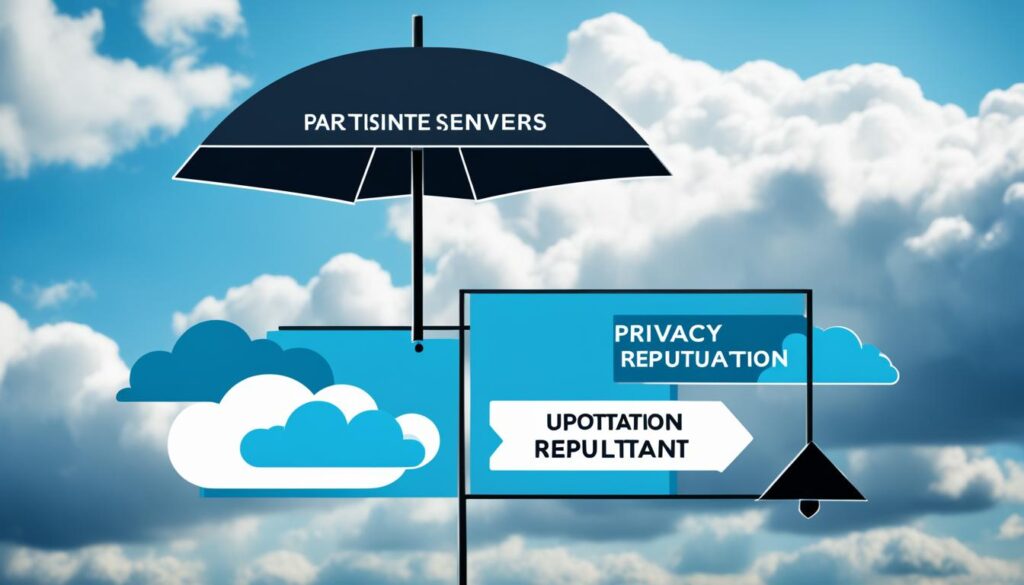Can we keep our privacy safe while still having a good online image? This is the big question in today’s world where data is key. We’re caught between protecting our personal info and making a good impression online.
In this age of big data, both companies and people struggle to balance privacy with trust. A huge 85% of consumers trust online reviews as much as they do personal advice1. But, with tough rules like GDPR, companies have to be very careful not to mess up their reputations2.
Data privacy laws like CCPA and HIPAA have changed fast, affecting how companies use our info. This has made transparency more important, with 73% of people saying it’s key for online reputation1. We’ll look into ways to keep our privacy safe while still managing our online image well.
Key Takeaways
- Privacy rights and reputation management are linked in the digital world
- More data means stricter privacy laws
- Being open is key to trust and managing your online image
- Finding a balance between privacy and a good online presence is tough but needed
- Good strategies can help us deal with the complex issues of digital privacy and reputation
The Rise of Data Collection and Its Impact on Privacy
In today’s digital world, collecting data is key for businesses. They collect lots of info on consumers, like personal details and what they like. This has made people worry a lot about their privacy.
Most people think companies should do more to keep our data safe. About 85% of us want this. And 77% think there should be more rules on how companies use our data3. This shows how worried we are about how our info is handled.
Data breaches are a big problem. For example, T-Mobile had a breach that affected 40 million people4. Also, having many devices connected can make you more likely to face a data breach. 29% of homes with over 30 devices had more than one breach last year3.
But, some people are okay with sharing their data if it helps them. A Forbes article found that 70% of us might share more data for a good reason5. This shows that people see both sides of sharing data.
Data privacy is not just about protection; it’s about control and transparency.
New privacy laws are coming up. California, Virginia, and Colorado have made laws to protect our data4. These laws help us control our personal info and how it’s used.
| Consumer Concerns | Percentage |
|---|---|
| Worried about device vulnerability | 60% |
| Concerned about smartphone data security | 67% |
| Believe they should be compensated for data use | 80% |
Finding a balance between personalization and privacy is hard. It’s a challenge for both businesses and us consumers.
Understanding Data Privacy in the Modern Era
Data privacy is a big deal today. We all want to keep our personal info to ourselves. Laws like GDPR, CCPA, and HIPAA make sure companies handle our data right6.
Since GDPR came out in 2018, more countries have made their own privacy laws. This includes the US, Brazil’s LGPD, and China’s PIPL7. Now, companies must follow these rules to keep up with laws and what customers want.
At the center of these laws are our rights as consumers. We’re getting more careful about sharing our info. A Salesforce study showed 83% of us worry about sharing personal data online. And 72% would stop buying from a company if they didn’t respect our privacy8.
“Privacy is becoming as essential as terms like ‘organic’ or ‘cruelty-free’ were in the past.” – Gartner
Companies are using different tools and methods to follow these laws:
- Data Loss Prevention (DLP)
- Secure storage with built-in protection
- Firewalls and encryption
- Endpoint protection
- Automated data discovery and mapping tools
Not following these laws can be costly. GDPR can fine companies up to €20 million or 4% of their yearly sales8. It’s clear that valuing privacy is not just right, but also smart for business.
| Benefits of Data Privacy Management | Challenges in Data Privacy Management |
|---|---|
| Building consumer trust | Embedding privacy mechanisms |
| Improved data governance | Complex regulations |
| Cost savings from prevention | Managing large volumes of data |
The Intersection of Privacy Rights and Reputation Management
In today’s digital world, our online reputation and data protection are closely linked. More people work remotely and spend more time online, leading to a boom in digital ads and promotions9. This change poses challenges for businesses aiming to keep a good brand image while also protecting consumer privacy.
More people who are new to the internet have opened doors for cybercriminals. This shows the importance of strong data protection9. Companies must balance their online presence with strong privacy steps to gain trust and protect their reputation.

New laws like the GDPR and CCPA have set new rules for data privacy. These laws focus on consent, collecting less data, and giving people more control over their info10. Following these laws helps avoid fines and builds trust with consumers, which can improve a brand’s reputation10.
To deal with these challenges, companies are using better security tools. Things like better encryption, more ways to prove who you are, and regular checks for security are key to keeping data safe and a good online image10.
| Privacy Measure | Impact on Reputation |
|---|---|
| Data Encryption | Builds trust in data security |
| Transparent AI Processes | Demonstrates ethical use of technology |
| Regular Privacy Audits | Shows commitment to ongoing protection |
The mix of privacy rights and managing a good reputation will keep changing. Companies that focus on both will do well online, building trust and keeping a good brand image.
Benefits of Respecting Consumer Data Privacy
In today’s digital world, keeping consumer data private is key for businesses to gain trust and grow. Companies that focus on data security build trust with their customers and others11.
Protecting data is very important. A huge 87% of people won’t support a company if it doesn’t keep their data safe. And 71% will leave if their data is shared without okaying it12. This shows how data privacy affects customer loyalty.

Strong security measures help fight off data breaches. This is crucial since big data leaks can expose over 3.5 billion records13. Such events can hurt a company’s trust, loyalty, and lead to big costs for fixing things and saving its reputation11.
Following data privacy laws helps avoid legal trouble and fines. For example, the GDPR can fine companies up to 4% of their global earnings for not following the rules13. By focusing on data safety, companies can lower legal, financial, and reputation risks11.
| Benefit | Impact |
|---|---|
| Increased Customer Trust | Higher customer retention and loyalty |
| Better Data Management | Improved marketing and customer support |
| Legal Compliance | Reduced risk of fines and litigation |
| Enhanced Reputation | Competitive advantage in the market |
Respecting privacy rights shields businesses from harm and opens doors for growth. Good data handling boosts sales, offers better marketing, and improves the customer experience11. By valuing data privacy, companies can stand out and get ahead in the market.
Implementing Effective Privacy Management Practices
In today’s world, having a strong privacy management program is key for businesses. Companies spend over $1.8 million on privacy programs on average14. This shows how serious they are about protecting data. In 2022, over 1,802 data breaches happened, affecting 422.1 million people14.

To keep data safe, companies should follow four steps: Embed, Establish, Evaluate, and Enhance15. This method helps make privacy a part of the company culture. It also makes sure they follow laws like the Australian Privacy Principles (APP).
Collecting only the data needed and storing it for a short time is important. This lowers the risk and builds trust with customers. Keeping track of privacy practices is also key15.
“Privacy is not just about compliance; it’s about building trust and enhancing our reputation.”
Good privacy practices have real benefits. Companies that focus on privacy are seen as more trustworthy. This can lead to more loyal customers and higher sales16. They also avoid big fines and legal costs from not following the rules16.
| Privacy Practice | Benefit |
|---|---|
| Data Minimization | Reduced Risk Exposure |
| Storage Limitation | Enhanced Data Integrity |
| Accountability Measures | Improved Compliance |
| Regular Evaluations | Continuous Improvement |
Putting privacy first helps businesses follow the law and stand out from the competition. It’s a smart move that brings trust, efficiency, and success over time.
Strategies for Balancing Personalization and Privacy

Today, making marketing personal is crucial. But, we must also respect privacy rights. The end of third-party cookies shows we need new ways to use data17.
We’re now using first-party cookies and zero-party data. Surveys and quizzes let customers share info willingly, making marketing better and safer17. This method matches what many U.S. internet users are okay with, sharing data for something in return18.
Being open about how we use data builds trust. We should tell customers how we collect their info and let them control it. Giving them choices to opt out helps our brand and follows new privacy laws1718.
Keeping data safe is key. Using strong encryption and secure storage protects customer info17. This is vital since many small businesses might face security issues18.
By finding a balance, we can engage more people and respect their privacy. This way, we can reach billions of social media users without losing their trust18.
Handling personal info online means using strong passwords, checking website security, and watching credit reports. These steps keep our online image good and protect our data19.
Conclusion
In wrapping up our talk on privacy and reputation, it’s clear a privacy-first approach is key today. With 76% of people checking online reviews for local shops, having a good online image matters a lot20. By using ethical data handling and putting consumer privacy first, companies can gain trust and boost their reputation.
The importance of privacy and managing your reputation is huge. A big 50% of job seekers wouldn’t take a job at a company with a bad name, even for more money20. This shows how vital it is for companies to focus on both privacy and reputation. Being open about data use and following global privacy rules is essential for trust online21.
Looking forward, finding the right balance between personalization and privacy is crucial for success. Regular checks on privacy can improve data safety, and sharing knowledge on data privacy draws in people looking for info21. By adopting these methods, companies can keep customers’ trust, stay ahead, and confidently move through the world’s growing focus on privacy.
FAQ
What is data privacy, and why is it important in the digital age?
What are some of the key data privacy laws and regulations that businesses must comply with?
How are privacy rights and reputation management connected?
What are the benefits of respecting consumer data privacy for businesses?
What are the key components of an effective privacy management program?
How can businesses balance personalization efforts with consumer privacy concerns?
Source Links
- Ethical Considerations in Online Reputation Management: Balancing Transparency and Privacy – https://medium.com/@arun.rout/ethical-considerations-in-online-reputation-management-balancing-transparency-and-privacy-bb46ec2f6042
- Privacy corporate reputation: Corporate Reputation Management in the Age of Privacy Concerns – FasterCapital – https://fastercapital.com/content/Privacy-corporate-reputation–Corporate-Reputation-Management-in-the-Age-of-Privacy-Concerns.html
- Data privacy and security worries are on the rise, while trust is down – https://www2.deloitte.com/us/en/insights/industry/telecommunications/connectivity-mobile-trends-survey/2023/data-privacy-and-security.html
- The State of Consumer Data Privacy Laws in the US (And Why It Matters) – https://www.nytimes.com/wirecutter/blog/state-of-privacy-laws-in-us/
- Impact of Data Privacy Regulations On Digital Marketing Practices – https://reactionpower.com/impact-of-data-privacy-regulations-on-digital-marketing-practices/
- What is Data Protection and Privacy? – https://cloudian.com/guides/data-protection/data-protection-and-privacy-7-ways-to-protect-user-data/
- 5 things you need to know about Data Privacy [Definition & Comparison] – Data Privacy Manager – https://dataprivacymanager.net/5-things-you-need-to-know-about-data-privacy/
- What is Data Privacy Management? – https://www.osano.com/articles/data-privacy-management
- Crisis Management at the Intersection of Marketing, Privacy, Security and Reputation – Rimon Law – https://www.rimonlaw.com/advertising-marketing-promotions-legal-update-privacy-publicity-cybersecurity-reputation-management/
- The Intersection of Big Data and Privacy – https://shinydocs.com/blog/the-intersection-of-big-data-and-privacy/
- 6 Reasons Why Data Privacy Is Important For Businesses – https://termly.io/resources/articles/why-is-data-privacy-important/
- Data Protection and Privacy for Customer Engagement – https://www.braze.com/resources/articles/data-protection-and-privacy-for-customer-engagement
- The consumer-data opportunity and the privacy imperative – https://www.mckinsey.com/capabilities/risk-and-resilience/our-insights/the-consumer-data-opportunity-and-the-privacy-imperative
- What is a Privacy Program and How Can You Build One? – https://www.osano.com/articles/privacy-program
- Privacy management framework: enabling compliance and encouraging good practice – https://www.oaic.gov.au/privacy/privacy-guidance-for-organisations-and-government-agencies/more-guidance/privacy-management-framework-enabling-compliance-and-encouraging-good-practice
- Privacy’s bottom line: Exploring the ROI of your privacy program – https://www.onetrust.com/blog/privacys-bottom-line-exploring-the-roi-of-your-privacy-program/
- Is There a Balancing Act Between Delivering a Personalized Customer Experience and Maintaining Consumer Privacy? – https://blog.adrianalacyconsulting.com/marketing-privacy-personalization/
- How to Balance Personalized Marketing With Data Privacy in 2021 – https://webbiquity.com/personalized-marketing/how-to-balance-personalized-marketing-with-data-privacy-in-2021
- Online Reputation vs. Online Privacy: Striking the Right Balance – https://www.netreputation.com/online-reputation-vs-privacy/
- Reputation management: The essential guide to protecting your brand – https://sproutsocial.com/insights/reputation-management/
- The Focus on Data Privacy in Reputation Management: Building Trust in a Digital World – https://www.linkedin.com/pulse/focus-data-privacy-reputation-management-building-trust-svhmf

